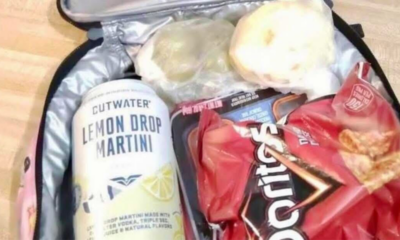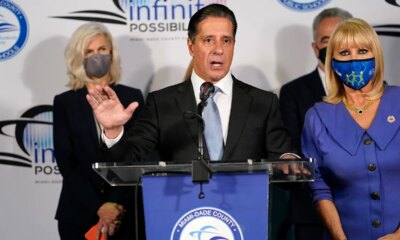Connecticut
Opinion: 119,000 reasons to take action in Connecticut in a crisis

In 2023, Dalio Education released a report that sent shockwaves through the state. There is a crisis in Connecticut, and one that we are not adequately seeing or naming, despite its pervasiveness. It is “Connecticut’s Unspoken Crisis,” and there are 119,000 Connecticut children and young adults who are at-risk of social isolation, academic failure, low educational and career aspirations, homelessness, unemployment and are disconnected from their peers, schools and communities.
Connecticut has a statewide crisis — one that will significantly impact the long-term resilience of our economy and the strength of our communities. However, like any other crisis, this will require action from all stakeholders. That is why CCM has convened the 119k Commission on At-Risk and Disconnected Youth, one that will not just name the problems, but develop a statewide strategy for getting young people back on track. The 119k Commission is comprised of bipartisan municipal leaders representing towns and cities across Connecticut.
Report: About 19% of CT youth ‘disconnected’ or ‘at risk’ in 2021-22
This is not CCM’s first foray into this work. After the release of the report, they put together five roundtables with expert panelists to discuss the findings. Dozens of people showed up in person, and tens of thousands watched these forums livestreamed at home. There is no doubt that this issue struck a chord with the public, and it’s likely because this is a crisis that has no borders, impacting every town and city in this state.
Because of this, because these children and young adults live in every corner of this state, urban and rural, it’s hard to imagine the scope of 119,000 individuals. Middletown mayor and panelist at a CCM roundtable, Ben Florsheim, called it “The Missing City.” And imagine for a moment, a Connecticut city, where the population is made up of entirely youth, 14- to 26-year-olds. It would be the fifth largest city in Connecticut — somewhere between Waterbury and Hartford in size. A city that large, disconnected from the state, is a crisis.
Many believe that this is a result of the pandemic, but that isn’t what the report found. The pandemic accelerated this crisis, but it is not the cause. Around 60,000 young people were experiencing disconnection, every year, in years well before the pandemic, and tens of thousands more were at-risk.
One in 3 students are at risk of not graduating high school. For the first time in years, the graduation rate declined in 2023. 41% of young men of color end up disconnected. These numbers are stark, but they don’t have to be.
We know this in part because we’ve seen the power of what people can do when they have the right access, and the right tools, to be a part of the solution. If there’s anything we learned from the CCM roundtables, it is that this is not a hopeless situation. There is cause for hope because of committed individuals around the state who are often already doing the work, but want to do more. But also because there are 119,000 reasons to be hopeful, 119,000 people who need us to care, and more importantly, to act.
Why should Connecticut act? There is the economic argument, that Connecticut will stand to save millions of dollars in government spending and gain unrealized tax revenue. There’s also the moral imperative to act, which is what drives us to serve as co-chairs of the 119k Commission. It’s the right thing to do for every young person; it’s the right thing to do for the future of our municipalities and our state.
Throughout the next several months, the 119K Commission will be holding meetings where we will build on the “Connecticut’s Unspoken Crisis” report and gather ideas to develop a statewide strategy for solving this crisis. We want you – the young person, the parent, the educator, the non-profit leader, the employer – to share your ideas for solutions. We will hold meetings around the state, where you will be able to submit testimony. Information on times and locations will be available on 119KCommission.Org. If you can’t make it in person, we will be livestreaming all of our meetings, and you will be able to submit testimony on our website.
Connecticut has 119,000 reasons to act, and solving this crisis begins with you standing up to share your voice.
Josh Brown, Elinor Carbone, and Andrew Ferguson are the tri-Chairs of CCM’s 119K Commission on At-Risk and Disconnected Youth.

Connecticut
Multiple cars involved in crash on I-84 in Hartford

A multi-vehicle crash temporarily close Interstate 84 on Tuesday night.
The crash happened around 8:30 p.m. and involved four cars, according to the Hartford Fire Department.
Fire crews arrived at the scene and helped one of the drivers who was trapped. The driver was then taken to a local hospital for evaluation and treatment.
Four other people reported minor injuries but declined ambulance treatment at the scene, officials said.
I-84 East was temporarily shut down as crews responded but has since reopened.
The Connecticut State Police is investigating the crash.
Connecticut
Sleet, freezing rain leading to treacherous travel in parts of Connecticut

As the snow turns to sleet and freezing rain in parts of the state this afternoon, it is causing some treacherous travel on Connecticut roads.
The Connecticut Department of Transportation is reporting several crashes.
There are crashes on both sides of Interstate 691 in Meriden.
A tractor-trailer jackknifed on the eastbound side of I-691 between Exit 5 and 3, closing the left lane. On the westbound side, a single-vehicle crash closed the left lane.
There is a two-vehicle crash on I-91 North in Middletown between Exits 20 and 21. The left and center lanes are closed.
A multi-vehicle crash has closed lanes of I-84 East in Waterbury between Exits 25 and 25A. There is a second crash on I-84 East in Southington near Exit 30.
In Cromwell, a two-vehicle crash closed the right lane of Route 9 North in Cromwell.
On Route 9 South, a crash closed a lane on the southbound side.
Connecticut
The Great Westport Sandwich Contest kicks off with event at Old Mill Grocery

The Westport Weston Chamber of Commerce held a kick-off event at Old Mill Grocery on Monday for The Great Westport Sandwich Contest.
The contest runs throughout March with 21 restaurants, delis and markets competing in 10 categories to be crowned the best sandwich maker.
Residents can vote in the following categories: Best chicken, best steak, best vegetarian, best combo, best club, best NY deli, best pressed sandwich, best breakfast sandwich, best wrap, and best fish/seafood sandwich.
After people sample sandwiches, they can vote for their favorites in each category on the chamber’s website. They will also be placed into a drawing to win a free sandwich from one of the 10 winners.
“Of course, the goal is to have people come to Westport and check out restaurants, our markets and our delis. This is a great promotion. I mean it is a competition, but mostly it’s to bring people to the restaurants. It also gives a great community activity because they are the ones who get to vote who makes the best one,” says Matthew Mandell, the chamber’s executive director.
Winners will be announced in April and receive a plaque.
The chamber has held similar contests to determine what establishment has the best pizza, burger, soup and salad.
-

 World6 days ago
World6 days agoExclusive: DeepSeek withholds latest AI model from US chipmakers including Nvidia, sources say
-

 Massachusetts7 days ago
Massachusetts7 days agoMother and daughter injured in Taunton house explosion
-

 Denver, CO7 days ago
Denver, CO7 days ago10 acres charred, 5 injured in Thornton grass fire, evacuation orders lifted
-

 Louisiana1 week ago
Louisiana1 week agoWildfire near Gum Swamp Road in Livingston Parish now under control; more than 200 acres burned
-

 Oregon5 days ago
Oregon5 days ago2026 OSAA Oregon Wrestling State Championship Results And Brackets – FloWrestling
-

 Florida3 days ago
Florida3 days agoFlorida man rescued after being stuck in shoulder-deep mud for days
-

 Maryland3 days ago
Maryland3 days agoAM showers Sunday in Maryland
-

 Culture1 week ago
Culture1 week agoTry This Quiz on Thrilling Books That Became Popular Movies

























